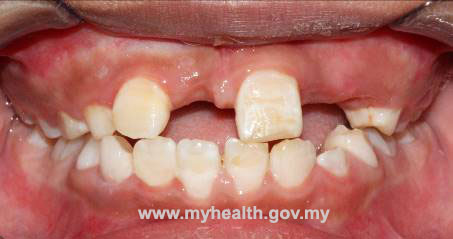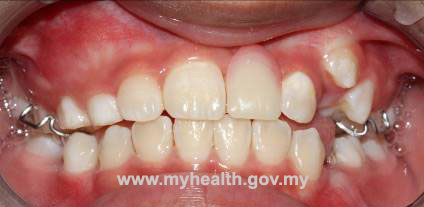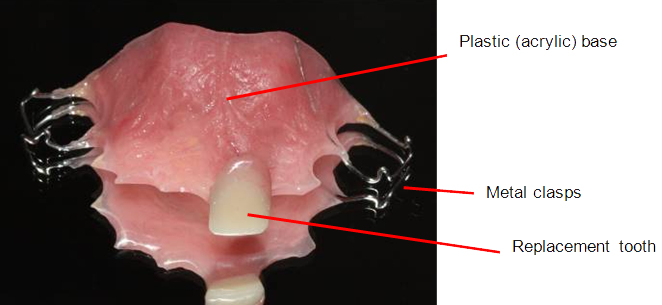Yes, children can wear dentures
Reasons of missing teeth in children
Children lose their baby teeth via natural process. Baby teeth loosen and the adult teeth will soon replace these missing teeth
‘Hypodontia’ is a condition where children have missing either baby or adult teeth as a result of failure of those teeth to develop in the gums.
Children can lose their adult teeth due to trauma from falls, motor vehicle accidents or sports injuries.
They can also lose teeth due to decay leading to infection and teeth will end up being extracted.

Missing adult teeth due to sports injury
What is a denture?
A denture is a removable replacement for missing teeth and surrounding tissues.
Dentures are mainly categorised into either partial or complete dentures.
Commonly children will be provided with a partial denture to replace missing teeth.
It consists of replacement tooth or teeth attached to a pink or gum-coloured plastic base complete with metal clasps.
Where tooth or teeth are missing, a partial denture can be fitted in children like adults.

Partial denture fitted in a child’s mouth
Purpose
- To improve the appearance and function by closing the gap left by missing tooth/teeth
- To maintain space while teeth on either side are erupting
- To replace missing teeth while waiting for childrens’ bones to be fully developed at the age of 18 years and older to insert a permanent bridge or implant
Materials
Replacement teeth and the base are made by plastic (acrylic)
The metal clasps are made from stainless steel wires

Procedures
- Moulds are taken of the mouth using an impression material called alginate. Alginate is made of brown seaweed also used for food thickener
- Child will bite on soft wax to register the teeth relationship
- The dentist will then select the shade and shape of the replacement acrylic tooth/teeth
- The mould will be sent to the dental laboratory
- Denture will be fabricated in the dental laboratory within a week’s time
What to expect
- In the beginning, the new denture will make your child feel awkward and bulky. This is normal and child will eventually be accustomed to wearing it
- Inserting and removing the denture will require some practice
- If the denture puts too much pressure on a particular area, that spot can become sore. The dentist may make some adjustments to the denture to make your child feel comfortable
- The denture should fit in the mouth with relative ease. Avoid biting down onto the denture to place it into position as it will break the plastic base or bend the clasps
Denture care and handling
- It is advisable to clean it in a sink of water or over a folded towel to prevent damaging or breaking the denture in case your child accidentally drop the denture
- Avoid using toothpaste since it contains abrasive ingredient which can scratch the denture surface
- Clean the denture every day using soft bristle toothbrush to remove food particles and plaque. This will help the denture from becoming permanently stained
- The dentist will recommend a suitable denture cleaner
- Rinse it thoroughly with running water
- In children, partial denture should be worn at all times except during cleaning. It keeps the teeth on either side from moving and gradually closing the gap leading to the denture cannot be fitted after some time
Adjustments
- Adjustments are needed with time to accommodate the eruption of new adult teeth in children which can affect the fit of the denture
- The dentist will adjust lose clasps at each review visits or take new mould when necessary
References
- www.mouthhealthy.org/en/az-topics/d/dentures-partial
- www.healthcentre.org.uk/dentistry/dentures-children.html
- Kidshealth.org/kid/grownup/getting_older/dentures.html
- www.toothclub.gov.hk/en/pnc/en_pnc_2_1_7_5.html
| Last Reviewed | : | 3 June 2014 |
| Writer | : | Dr. Mimi Syazleen bt. Abdul Rahman |
| Accreditor | : | Dr. Hjh. Noraini @ Nun Nahar bt. Yunus |







